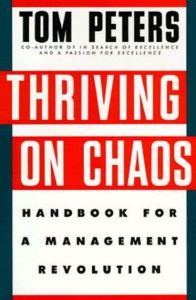Únase a getAbstract para acceder al resumen.

Únase a getAbstract para acceder al resumen.
Tom Peters
Thriving on Chaos
Handbook for a Management Revolution
Knopf, 1987
¿De qué se trata?
As your business faces rapid change, embrace it. Innovate. Envision the future. What doesn't kill you makes you stronger.
Recommendation
In Search of Excellence guru Tom Peters says today’s rapidly changing times are forcing a management revolution. He suggests that being excellent is no longer enough: companies need to be perpetually ready to innovate. They must be willing to make continual improvements because the business environment is so competitive. Rather than focusing on cost-cutting efficiencies, these improvements must stress providing customers with value. He predicts this rapidly changing world - fueled by new technology - will be unpredictable, so companies must learn how to "thrive on chaos" to survive the turbulent times ahead. To this end, Peters offers a series of steps that managers must take to become proactive and respond to change. He organizes his action prescriptions in five areas of management: 1) being responsive to the customer; 2) constantly innovating in all areas; 3) entering partnerships with everyone connected to your organization; 4) creating an inspiring vision based on change; and 5) setting up controls that measure what’s really important. Peters wrote these prescriptions in 1987, but they are still timely, since change continues unabated. This classic is easy-to-read, with hands-on specific strategies. getAbstract.com recommends it to everyone in business.
Summary
About the Author
Tom Peters is a management consultant, who has written many business books, including In Search of Excellence (with Robert H. Waterman, Jr.), A Passion for Excellence (with Nancy Austin), Liberation Management, The Circle of Innovation and The Tom Peters Seminar.

























Comment on this summary